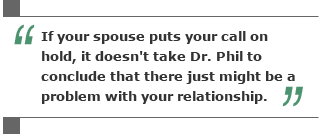There's currently a lot of discussion about "engaging" and "connecting" with today's consumers. However, much like the weather, it seems that everyone's talking about it, but nobody's doing all that much about it.
Last September, the American Association of Advertising Agencies teamed up with the Advertising Research Foundation to host a first-ever joint conference devoted entirely to this topic. They gathered some of the best minds in advertising, marketing, and academia to spend two days wrestling with consumer engagement -- what it is, how to recognize it, what it means, and of course, where advertising might fit into the equation.
 |
Advertisers aren't the only people talking about engaging consumers. Companies around the globe have been touting the fact that healthy businesses are built on relationships, not just transactions. Whether they're marketing airlines, autos, or search engines, chief marketing officers are making bold proclamations about fostering customer relationships. Even Procter & Gamble, historically associated with the hard-nosed, hard-sell marketing of diapers and laundry detergents, is sounding the clarion call of relationships. In a March address to a national media conference, P&G's CMO Jim Stengel talked about the need to focus on nurturing consumer relationships, claiming that "market share is trust materialized."
A casual search through the business consultancy blogs indicates that today, it's all about emotional branding, "culting," consumer evangelism, and even "lovemarks." Can't you just feel the love? Actually, no. Not if you're a customer, anyway.
Everyone agrees that engagement is a worthwhile pursuit. Reams of Gallup data support the contention that the emotional connections a company creates with its customers are impressively linked to the company's profit performance. Emotional bonds have an impact on outcomes that matter as much to a CFO as to a CMO. Relationship building, we've learned, is smart business. (See "The Engagement Imperative" and "Customer Satisfaction Doesn't Count" in the "See Also" area on this page.)
The problem is that too many companies forget what's implied -- and required -- by a "relationship." Relationships are reciprocal. That seems obvious, but evidently, it's not.
A failure to communicate
Consider how communication flows in the typical customer relationship. When customers seek to actively participate in the implied relationship dialogue, what happens? They are greeted with an all-too-familiar recording assuring them that "Your call is important to us," while they wait on hold to speak to an outsourced company representative somewhere in India. Or they wait in line for their number to be called so they can finally approach the service desk, where they get to speak with someone who may not have the authority to solve their problem. Or they send an e-mail or leave a voice mail message for an anonymous disembodied recipient -- a message that may not be acknowledged.
 |
This doesn't sound all that much like a relationship. If your call were truly important, it would be answered. As I argued in my book Married to the Brand, brand relationships are like marriages. If your spouse puts your call on hold, it doesn't take Dr. Phil to conclude that there just might be a problem with your relationship.
Consider also the other half of this allegedly reciprocal relationship, the communication that flows from the company to the customer. When the company chooses to interact with the customer, what happens? The company rarely, if ever, initiates a dialogue. Rather, what the customer receives is a monologue in the form of a sales pitch. The company's communication may now be in the form of an e-mail instead of a TV commercial, but in many ways, the message is the same as it always was. It's a one-way communication from the company to the customer. This kind of communication doesn't seek to reinforce the sense of reciprocity. It doesn't aim to reward or recognize the message recipient; it mainly rewards the message sender. It simply seeks to sell.
That doesn't sound like much of a marriage -- when one partner communicates with the other only when they want something. It doesn't have to be that way, but it sure seems to be. Valentine's Day came and went. Have you gotten a card yet from any of the companies that claim to be interested in building engagement and enhancing their "lovemarks"? Forget about flowers and candy; I never even got a note.
Relationships can't be all that important when customer anniversaries are forgotten, engagement-enhancing opportunities are ignored, and communication from the company "partner" seems patently self-serving. In the eyes of the customer, it seems that most companies are actually doing very little to earn the love that they claim they want.
Reward, respect, and recognition
Emotional connections aren't merely the result of warm, fuzzy commercials and company slogans that speak of "passion." And emotional bonds aren't created by discounts, membership points, airline miles, and gifts -- even though some companies think these are the rewards that today's customers want. Frequent-buyer discounts may trigger a transaction, but they're rarely the basis for an enduring emotional bond. Love requires more than a promise and more than a coupon.
Gallup's research has shown that one of the essential cornerstones of an engaged relationship is a strong feeling on the part of the customers that they are truly respected and that their patronage is clearly valued by the stores where they shop and the companies with which they do business. Respect for consumers isn't proven by companies' slogans; it's demonstrated by their actions. And, as in a successful marriage, it can't be demonstrated just once.
If marketers around the world want to move beyond just talking about embracing customer relationships, they must reinforce the reciprocal nature of those relationships at every touchpoint and in every moment of customer contact. In far too many cases, they're not.
A little less talk, a lot more action
Companies can now reliably measure how engaged their customers are with their products, services, or brands. Relationship strength can be monitored through Gallup's 11-item metric, the CE11. (See "The Constant Customer" in the "See Also" area on this page.) That's obviously a crucial first step toward enhancing these relationships. And relationships can certainly be talked about in the boardroom. That's also an important step, because a CEO's real passion for building customer relationships can help transform an organization.
But measures and mantras aren't the only answers. Customer relationships aren't generated by customer surveys, and they aren't formed in the boardroom. They ebb and flow at each point of customer contact.
If one crucial requirement for a healthy marriage centers on communication and dialogue, then the same holds true for brand relationships. In order for the customer connection to grow stronger, companies must enhance their ability, their determination, and their mechanisms for hearing -- and responding to -- what the customer has to say.
Companies must do more than pay lip service to listening and to caring, and they have to do more than create a snappy slogan stating how much they yearn to delight their partners. They must take action to transform the customer experience, and they must be prepared to significantly change the ways in which they currently interact with their customers. (See "Can Your Company Handle Change?" in the "See Also" area on this page.) Time and time again, they must show their love if they expect it to be returned.